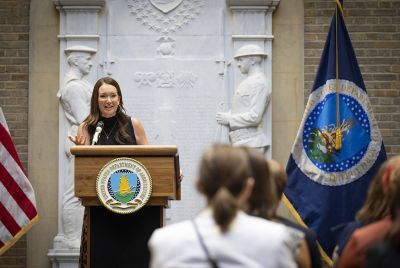UK may have to wait until 2022 to broker its own free trade deals says Philip Hammond
Chancellor says that 'many things will look similar' as the UK transitions out of the EU.
Chancellor Philip Hammond risked sparking a new Conservative row over Brexit as he suggested that a transitional period between the UK and EU could last up to three years, speaking in an interview on Friday 28 July.
Hammond, who campaigned for a Remain vote at the EU referendum, told BBC Radio 4's Today programme that Brexit had to be completed by the next general election in 2022.
"People have talked about a year, two years, maybe three years," he said. "I think there's a broad consensus this agreement has to be completed by the time of the scheduled next election in June 2022. So a maximum of three years."
But since "many things will look similar" that means the UK will not be able to broker it own free trade deals with non-EU nations until after the transition period is over.
Such a scenario would be a considerable blow for International Trade Secretary and Eurosceptic Liam Fox, who has most recently been championing a free trade deal between the US and the UK.
"We will have a transition period dictated by the technical necessities of implementing new systems," Hammond added. Elsewhere, the Chancellor admitted that it would be some time before government can introduce "full migration controls between the UK and EU".
The comment comes just a day after Home Secretary Amber Rudd asked the independent Migration Advisory Committee (MAC) to investigate the economic benefits of EU immigration to the UK.
Philip Hammond says it will be some time before "we can introduce full migration controls between the UK and EU" #r4today
— BBC Radio 4 Today (@BBCr4today) July 28, 2017
The Conservatives promised to cut net migration to "tens of thousands" at the general election, but EU free movement is expected to continue during the Brexit transition period. "European citizens will still be able to come here but they will have to register," Hammond said.
"Immigration was one of the leading factors for why the British people voted to leave the EU and voters want to see a clear vision for a post-Brexit EU migration policy," said Richard Tice, co-chair of the Leave Means Leave campaign.
"If freedom of movement for EU citizens continues, we could easily see another one million extra EU migrants move to Britain in a two year transition period. Our infrastructure, public services cannot cope with this and low paid workers don't deserve this.
"Stalling on this is unfair on the British people who voted to take back control of their borders, businesses who want certainty and EU citizens who deserve to know how a post-Brexit British immigration system will work."
© Copyright IBTimes 2025. All rights reserved.




















